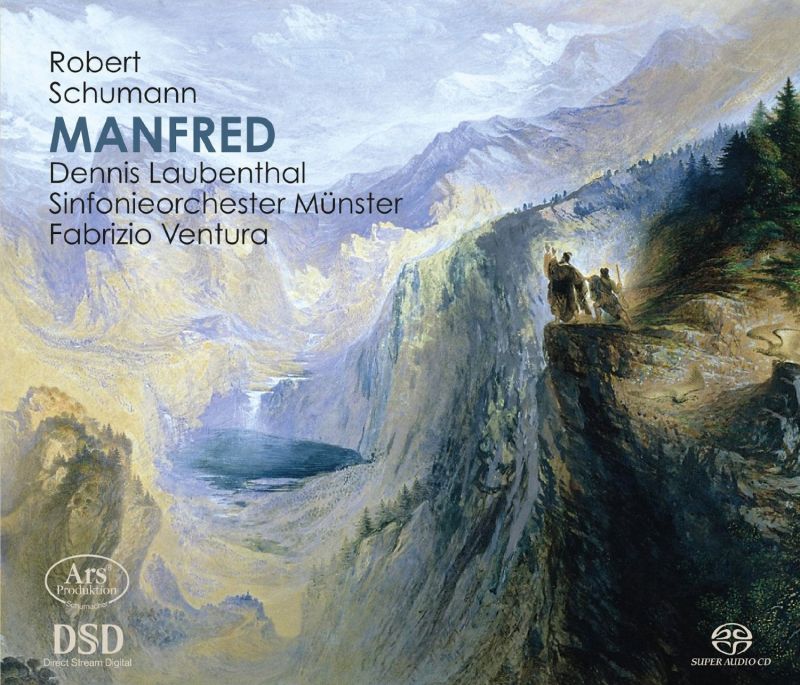SCHUMANN Manfred
View record and artist detailsRecord and Artist Details
Composer or Director: Robert Schumann
Genre:
Vocal
Label: Ars Produktion
Magazine Review Date: 03/2016
Media Format: Super Audio CD
Media Runtime: 66
Mastering:
DDD
Catalogue Number: ARS38 192

Tracks:
| Composition | Artist Credit |
|---|---|
| Manfred |
Robert Schumann, Composer
Aurel Bereuter, Gemsjager Claudia Hübschmann, Alpenfee Dennis Laubenthal, Manfred Eva Bauchmüller, Soprano Fabrizio Ventura, Conductor Julia Stefanie Möller, Astarte Lisa Wedekind, Mezzo soprano Lukas Schmid, Bass Münster Concert Choir Münster Philharmonic Choir Münster Symphony Orchestra Regine Andratschke, Nemesis Robert Schumann, Composer Soan Yeong Shim, Tenor |
Author: Richard Wigmore
The brooding, darkly impassioned Overture is a justly famous concert item. Yet unlike the music to Mendelssohn’s A Midsummer Night’s Dream, the 15 numbers that make up Schumann’s incidental music – choruses, an entr’acte and long stretches of melodrama – only make sense when performed within the context of the poem. For CD buyers who want the poem (or most of it) in the original English, Beecham’s inspired if typically idiosyncratic recording, tricked out with extra bits of Schumann (Sony etc, 2/59, 9/91), has long had the field to itself. Two more recent German-language versions, from Gerd Albrecht (Schwann, 2/86) and Michael Schønwandt (Kontrapunkt, 4/95), prune the text and snip the odd bar of music. So while non-German speakers will have to rely on the booklet, it is good to have a new recording that respects Schumann’s text (reduced from Byron’s original) and presents the work faithfully, albeit in a rather unvaried acoustic.
Actor Dennis Laubenthal arguably makes the life-weary, guilt-ridden Manfred insufficiently anguished, though his roundly mellifluous tones are always pleasing on the ear. The other non-singing parts – spirits (mainly evil), chamois hunter, abbot and the phantom of Manfred’s beloved half-sister Astarte – are all effectively taken, even if the female spirits in unison irresistibly evoke Mozart’s Three Ladies throwing a wobbly. Musically things are fair to good. Even without memories of Furtwängler’s incandescent performances with the Berlin (DG) and Vienna (EMI) Philharmonics, the Overture here never quite surges and soars across the bar-line, while Schumann’s writing predicates a richer, more saturated string tone than the Münster orchestra can conjure. But the singers, solo and choral, do well as airy or ominous spirits, and as monks in the haunting ‘Requiem aeternam’ that threads through the final dialogue.
The meshing of speech and music in the melodramas is convincingly timed, and Fabrizio Ventura is ever alive to the ravishing delicacy of Schumann’s orchestration, above all in the diaphonous, otherworldly half-echoes of the Overture that accompany Manfred’s scene with Astarte’s phantom. I’m glad to have heard this. But I suspect most Anglophone listeners will be happier with the old Beecham recording, not only for the language but for the conductor’s dramatic flair and the exquisite way he shapes Schumann’s shards of fragile, troubled lyricism.
Discover the world's largest classical music catalogue with Presto Music.

Gramophone Digital Club
- Digital Edition
- Digital Archive
- Reviews Database
- Full website access
From £8.75 / month
Subscribe
Gramophone Full Club
- Print Edition
- Digital Edition
- Digital Archive
- Reviews Database
- Full website access
From £11.00 / month
Subscribe
If you are a library, university or other organisation that would be interested in an institutional subscription to Gramophone please click here for further information.




